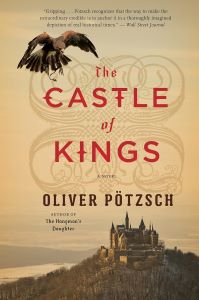Popular German author Oliver Pötzsch elevates arcane history.

Oliver Pötzsch excels at making arcane German history come to life. The author of the bestselling Hangman’s Daughter series, Pötzsch, in the standalone novel The Castle of Kings, turns his attention to the Trifels castle in the Rhineland Palatinate.
Trifels is most famous for having served briefly as a prison for Richard the Lionheart in 1193 after his capture returning from the Third Crusade. We’re all familiar with the discovery of Richard’s prison by the troubadour Blondel, but we’re much less aware of the Great Peasants’ War in 1524, by which time Trifels had fallen to semi-ruin (it has since been rebuilt and is a tourist attraction).
Pötzsch, who wrote about the Disneyesque castle of Neuschwanstein outside of Munich in The Ludwig Conspiracy, continues his obsession with medieval edifices here. The Castle of Kings takes place at what was once the center of the German empire; Trifels housed the imperial regalia until it was moved by descendants of the legendary Holy Roman Emperor Frederick Barbarossa, who drowned on his way to the Third Crusade.
This may be too much history for a casual reader, but since I lived in Germany for 11 years and was familiar with Mainz, Speyer, and the whole Palatinate, the book was riveting. Aside from its graphic portrayal of 1500s warfare, swords, and cannons, The Castle of Kings concerns ambition and its limits as protagonists Mathis and Agnes travel along the Rhine during the war and find that love really does conquer all.
It’s these universal themes that carry the narrative as Agnes, thinking she is a humble knight’s daughter, discovers her noble origins before deciding to abandon all that for Mathis, her childhood friend and the son of a blacksmith, who becomes a master gunner. The particulars of a rigid class structure torn apart by war become a backdrop for their story, which is filled with twists and turns, blood and gore, and a convincing cast of characters largely free of anachronism.
The Hangman’s Daughter and the subsequent volumes in that series take place somewhat later in a different locale — 17th-century Bavaria — and don’t involve castles but are based on Pötzsch’s actual ancestor, the titular hangman. Pötzsch has penned other series, too, including the first installment in the forthcoming Leopold von Herzfeldt series, The Gravedigger’s Almanac, set in fin-de-siecle Vienna, as well as YA novels.
After working as an editor for Bavarian radio and television, Pötzsch became a full-time author in 2013 and has since mastered the art of using long-ago history to portray timeless themes. His attention to historical detail gives his books authenticity, but it’s the writing that makes them a good read.
Darrell Delamaide is author of the novels The Grand Mirage and Gold.

